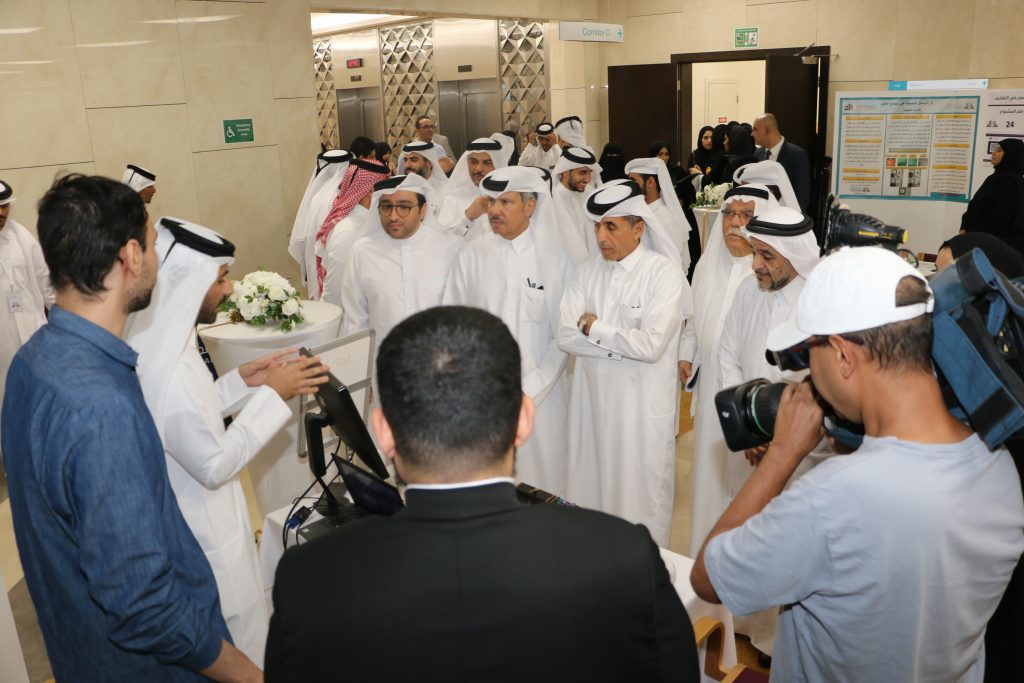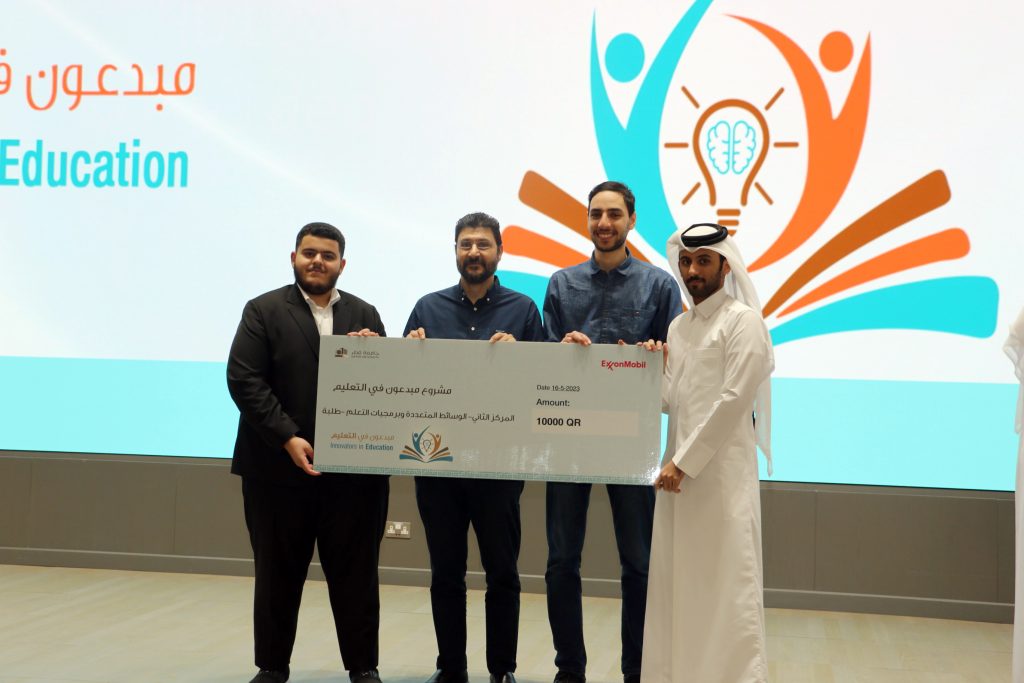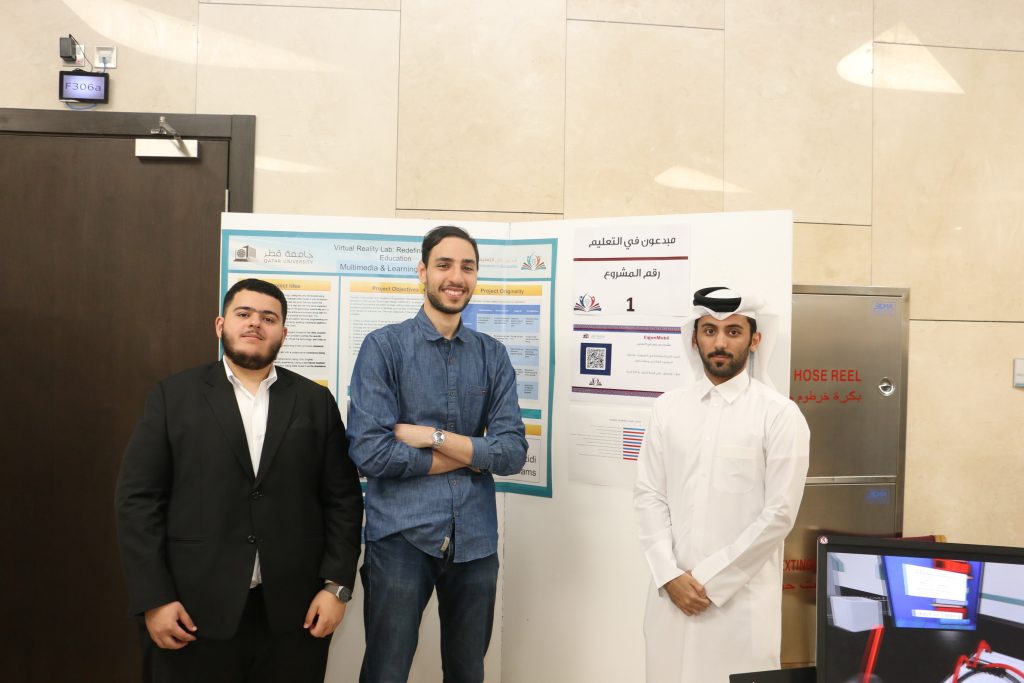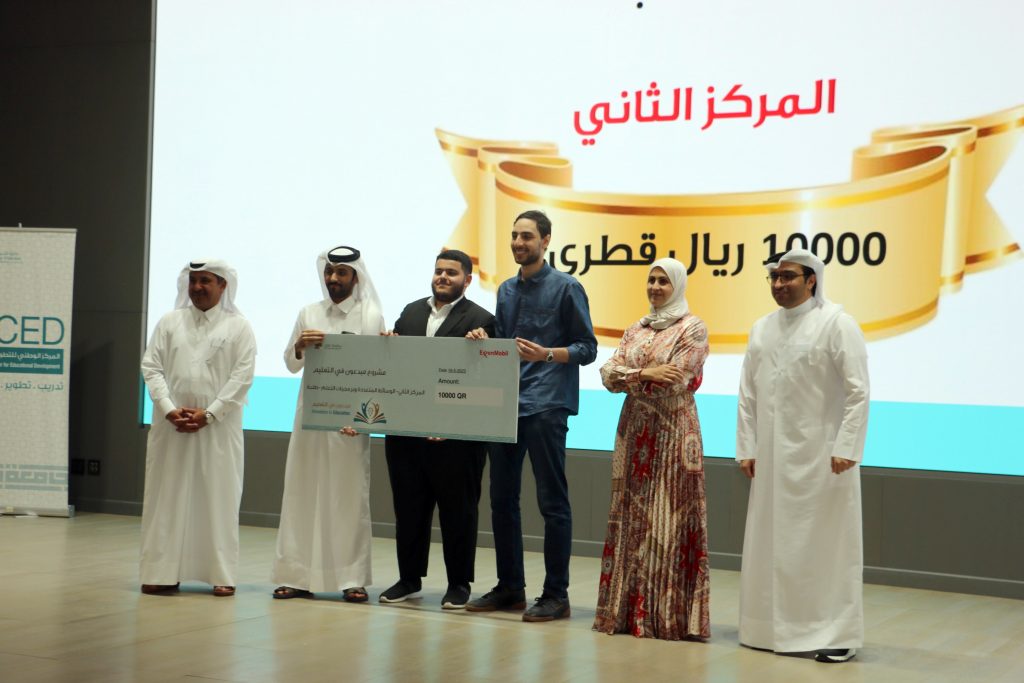Home » Achievements » Students
Category Archives: Students
Recent Posts
- Invitation to seminar| Reliable communication from 5G to 6G networks
- Invitation to seminar| Quantum Computing: Potential and Opportunities
- Invitation to seminar| Wearable electronics in the metaverse space -Challenges and Opportunities
- Invitiation to seminar| Satellite Spoofing Detection and Mitigation
- Invitation to seminar| Application of DRONS with Artificial Intelligence in military operations
Archives
- April 2024
- March 2024
- February 2024
- January 2024
- December 2023
- November 2023
- October 2023
- September 2023
- June 2023
- May 2023
- April 2023
- March 2023
- February 2023
- January 2023
- December 2022
- November 2022
- October 2022
- September 2022
- August 2022
- May 2022
- April 2022
- March 2022
- February 2022
- January 2022
- December 2021
- November 2021
- October 2021
- September 2021
- August 2021
- July 2021
- May 2021
- April 2021
- March 2021
- February 2021
- January 2021
- December 2020
- November 2020
- October 2020
- September 2020
- August 2020
Categories
Humanitarian Drone Competition by CSE Students
December 11, 2023 / Leave a comment
The CSE department has organized an “Humanitarian Drone Competition” as part of the course project for the “Computer Engineering Practicum” course..
The motivation for this year’s project is to show solidarity with people in Gaza. Unlike typical control circuits used in the drones, the students of the course were asked to design a control circuit for the drone with only passive electronic components and basic IC to control the motors of the drones. In order to achieve this, the students had to go through phases of idea description, schematic design, breadboard prototyping, and a final soldered prototype that has to have at least three functionalities that can assist the humanitarian mission.
The winning drones were judged based on their design, number of functionalities incorporated in the design, A4 poster and a video montage of their work carried out during the project.
The winners in the competition were:
Male Students
- First place: Yusuf Siddiqui, Iheb Zouari, Mohamed Ali, Mahmoud Ali
- Second place: Mubarak AlHajri, Abdulrahman Marwan Aboumadi, Ahmed Miqdad, Deya Aldeen Abdelbaset
- Third place: Muhammad Khan, Abdullah Irhimeh, Laith Nasrallah
Female Students
- First place: Isra Ali, Yoma Mohammed, Maya Attia, Nooralhodaa Elshawadfy
- Second place: Roaa Shady, Noha Elgamal, Amna Al-Ahmed
- Third place: Aisha Al Mannai, Naema Al Abdulla, Hila Al Dosari, Fatima Al Ali
The competition was judged by our faculty members Eng. Amelle Bedair , Eng. Farah E-Qawasma and Eng. Amal Elmasri. The prizes for the winners were awarded by the HoD Prof. Amr Mohamed.
Thanks Voltaat for sponsoring the prizes worth 2,000 QAR. Thanks to Dr. Wadha Labda for her kind support as well to make the awards ceremony in the ICET’23 events. Thanks for the course coordinator Eng. Naveed Nawaz, course instructors Eng. Leila Ghastli and Eng. Tamer Eltaras, and all other faculties for making this competition a successful one.
CSE receives Three QRNF Academic Research Grants (ARG)
November 5, 2023 / Leave a comment
Our CSE department has just been awarded three Academic Research Grants (ARG) from the Qatar National Research Fund (QNRF) in its inaugural round. The three awarded projects are led by Prof. Amr Mohamed, Prof. Somaya Almaadeed, and Dr. Ahmed Badawy.
Here are more details about the awarded projects:
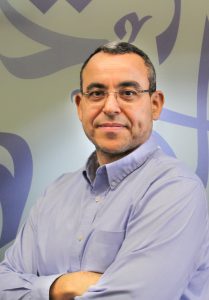
The PervasiveAeroAgents platform’s primary objectives are designed to address important challenges facing disaster scenarios, including 1) establishing the system architecture and describing coordinated multi-drone features such as sensing specifications, wireless charging, intelligent detection algorithms, and autonomous navigation. 2) Developing AI-based computer vision techniques using machine learning, to detect and identify objects and individuals among the debris, while using Reinforcement learning (RL) and online learning (OL) techniques for autonomous navigation, speeding up search and rescue operations in stochastic and highly changing environments. 3) Developing new security protocols suitable for dynamic ad hoc group communications amongst the drones to guarantee integrity and confidentiality. Finally, 4) build a comprehensive proof-of-concept using digital twin technology to demonstrate system features and insure the efficacy of the proposed sensing and AI-based techniques for group ad hoc communication.
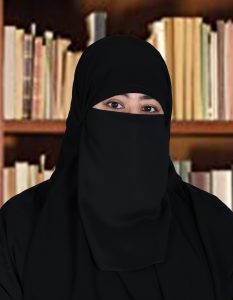
Project abstract: Cancer, which has been identified as a significant public health issue in Qatar and worldwide, can be diagnosed early and accurately with the help of biomedical imaging. It is true that there has been a significant increase in cases of breast, thyroid, colon, prostate, lung, and stomach cancer over the past five years [1]. For instance, Qatar has one of the highest rates of female breast cancer incidence and mortality when compared to the other Middle Eastern regions. In Qatar, the latest Qatar National Cancer Registry (QNCR) report of 2020 revealed that breast cancer had the highest incidence among all types of cancers. It accounted for 37% of all cancer cases, with 218 new cases reported. Colorectal cancer ranked second among female cancers, comprising 10.7% of cases with 62 reported instances. Thyroid cancer held the third position, representing 7.2% of female cancer cases with 42 reported cases [2]. Due to a variety of factors, including lifestyle choices, environmental effects, and other factors, there are an increasing number of cases of breast cancer in Qatar and the surrounding nations. Imaging and biomedical imaging techniques, such as histology image [3], and/or positron emission mammography (PEM) for breast cancer screening [4], are frequently used by caregivers to accurately detect the spread of cancer in the human body. To locate, segment, and categorize malignant tumors, these biomedical imaging approaches rely on image processing and Artificial Intelligence (AI) [4]. Both AI and computational imaging and analytics for cancer detection layer of these imaging approaches are not sufficient to provide accurate diagnose of cancer and doctors do not understand the science behind the result. Therefore, we need a much smarter way to explain and hence link the results to the clinical data. Together with medical doctors in Qatar and UAE we aim to develop new tools and techniques for multimodal breast tumor classification based on integrative data analysis from imaging and clinical data including histopathological and OMICs. We aim to develop explainable AI tools to outline how the AI produced a certain result. AI can be used as a support system that scans image and process corresponding clinical data by extracting the areas, features, or data with a high probability of cancer to simplify a doctor’s job and provide additional hints for medical care and competence. Furthermore, this proposal aims to decipher the molecular pathogenesis of breast cancer using artificial intelligence through integration of histopathological images and OMICs data from different breast cancer subtypes. Multimodal data fusion of morphology, gene expression, and DNA mutations using IHC and OMICs technology has yet to be explored in depth. Implementing this approach using AI and Deep Learning (DL) can lead to a more accurate diagnosis of the disease and timely treatment. This will improve their overall survival and decrease the economic burden of breast cancer.
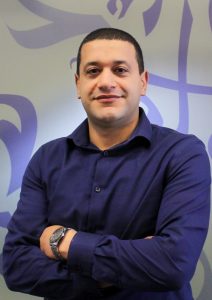
Project abstract: The Open Radio Access Network (O-RAN) is on track to completely transform the telecommunications ecosystem in the coming decade. O-RAN specifications are expected to drive 50% of RAN-based revenues by 2028 for public networks and by 2027 for enterprise and industrial cellular segments and will exceed traditional RAN by 2030. This research proposal aims to investigate and develop a reliable O-RAN framework for time-critical and high-resource-demanding healthcare applications.
QU Team Secures 3rd Place in ICPC Programming Competition, Earns Ticket to Egypt
September 26, 2023 / Leave a comment
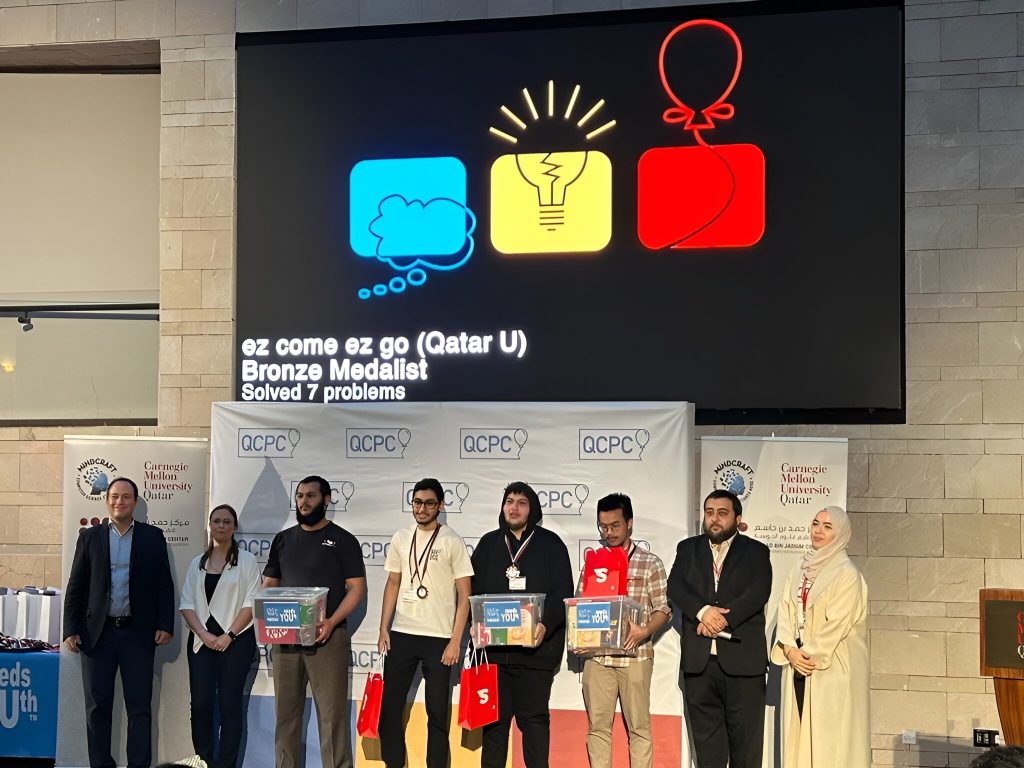
In an impressive showing of skills and determination, a team of students from Qatar University has secured the third spot in the highly competitive Qatar Collegiate Programming Contest (QCPC), part of the International Collegiate Programming Contest (ICPC). Often regarded as the “Programming World Cup,” ICPC challenges teams to tackle algorithmic problems and devise programming solutions. The accomplished team, composed of Aly Soliman, Mohamed Fauzan, and Omar Elshenhabi, demonstrated remarkable programming skills and problem-solving abilities, earning them their place in the regional competition. Their achievement is a testament to their hard work and dedication in the field of programming.
The national stage of the competition (QCPC), hosted at Carnegie Mellon University-Qatar, provided a platform for teams across Qatar to go for a chance to advance to the regional level. This event served as a qualifying round for the Africa and Arab Regional Competition (ACPC), scheduled to be held in Egypt’s Sharm El Sheikh end of this year.
As they prepare to represent Qatar on the regional stage, the students are poised to compete among the top talents in the region. While they secured third place nationally, Qatar University takes pride in their accomplishment, and we eagerly anticipate their performance in Egypt. We extend our best wishes to the team and their coach, Hamza Saleh , as they prepare for the next phase of the ICPC.
AI Olympiad showcases talent of CSE students in programming, mathematics and robotics
June 24, 2023 / Leave a comment
Three students from Qatar University (QU) showcased their exceptional talent in the second edition of the Arab Artificial Intelligence Olympiad that was organized by Arab Robotics and AI Association, in collaboration with STEAM Centre on 24 June 2023, in Amman, Jordan. The event has featured five competitions that served as a platform for Arab youth of all age groups in the fields of programming, mathematics and algorithms, computer vision, cybersecurity, and embedded systems.
The outstanding participants from QU were granted the prestigious Talent Scholarship. Faisal Abdullah Salam Batis, Marcus Wein Esmiller Monteiro, and Galal Faez Salem Ban Amr excelled in various courses and secured top positions in multiple categories at the Olympiad. Marcus and Galal secured the first place in the programming course, while Marcus, Galal, and Faisal achieved the second position in the embedded systems course. Faisal also claimed the third spot in the mathematics and algorithms course.
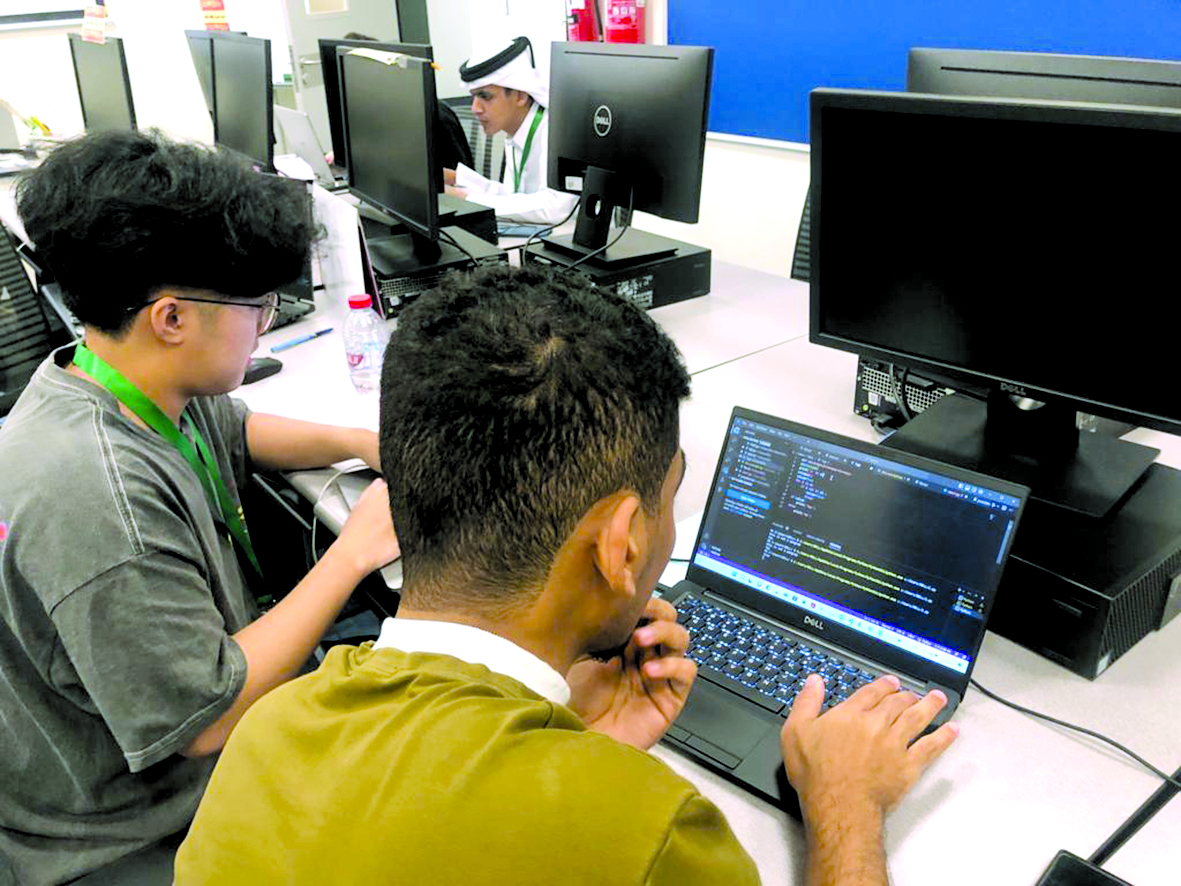
Knowing that in this year, more than 150 students from Jordan, Palestine, Kuwait, Qatar, Libya, Yemen, and Egypt representing over 20 schools and 13 universities from around the Arab world participated in the Olympiad.
Commenting on the event, Dr. Saleh Al-Hazbi, Lecturer of Computer Science at QU, said, “The Artificial Intelligence Olympiad is a competition that aims to raise awareness about the growing significance of AI in today’s world. Our participating students, who have showcased their talent in various categories, have been accepted into QU’s prestigious Talented Students Program. This program, offered at QU, aims to attract students with exceptional talents in different fields.”
Marcus Monteiro, the winner of first place in the programming course, expressed his thoughts on the experience, saying, “I, along with my fellow participant, Galal, was extremely nervous, but we realized the competition would be tough with participants from other countries. However, as we began answering the questions, we gradually gained more and more confidence. I told my colleague, ‘We will win this competition for Qatar’.” He stated, “The future of artificial intelligence is very bright. Many people believe that AI will take away people’s jobs, but we see it as a tool for the future, making us smarter and more capable.”
reference: Here
CSE Best Senior Projects 2023
May 28, 2023 / Leave a comment
On May 25th, the highly anticipated senior projects’ presentations took place at the state-of-the-art new engineering building H07. These remarkable projects, the culmination of tireless efforts by talented students, were subjected to rigorous evaluation by industry examiners. After careful deliberation, three outstanding projects from each program, Computer Science (CS) and Computer Engineering (CE), emerged victorious. These exceptional teams have been chosen to proudly represent our department in the upcoming college contest day on June 11th. We eagerly anticipate the success that awaits our representatives as they compete at the college level, and we are confident in their abilities to make our department proud once again.
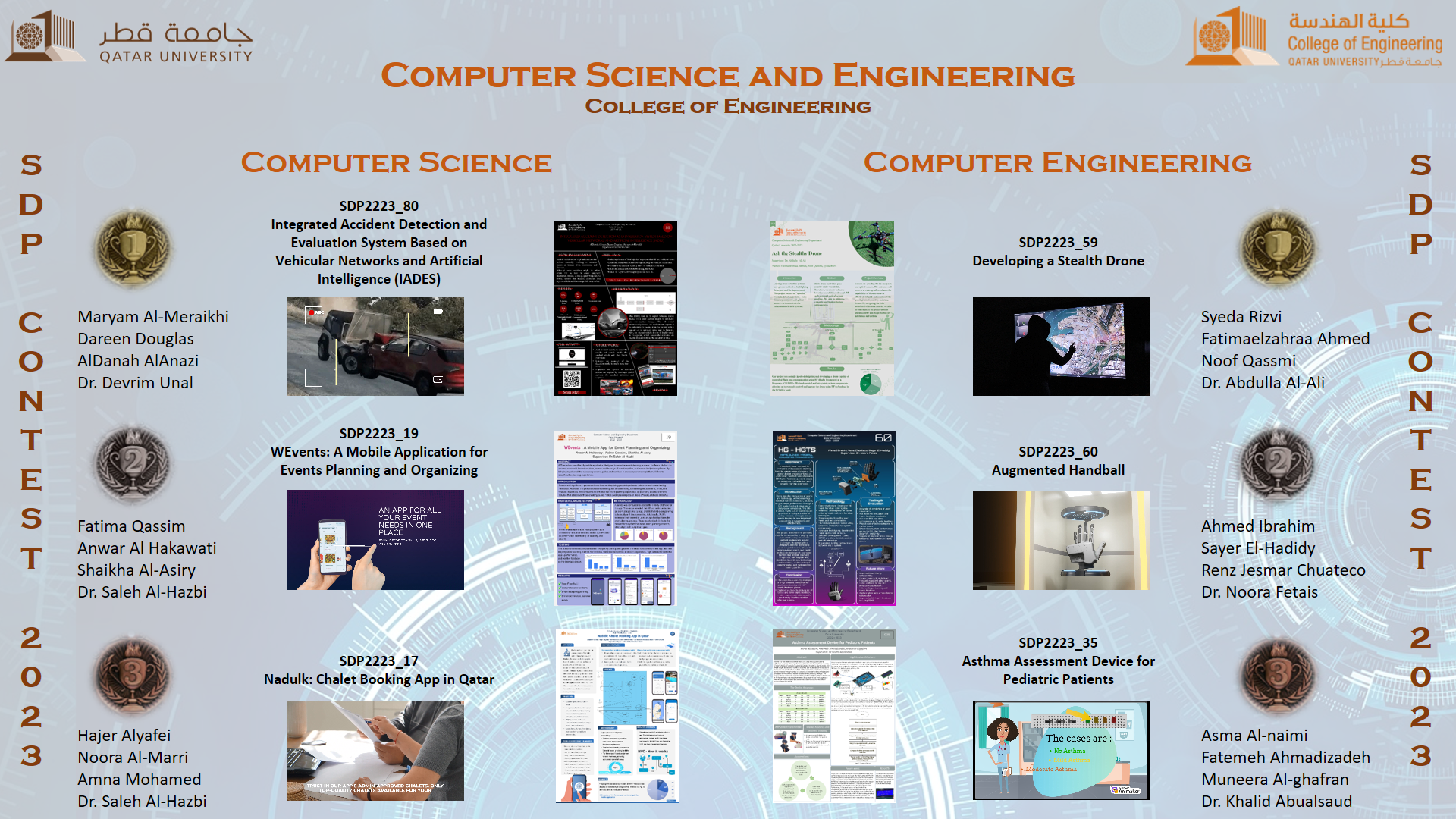
Winning Projects in CSE-SDP23 Contests Day
CE Rank 1
Project Title: Developing a Stealth Drone ‘’Ash”
Students: Fatimaelzahraa Ahmed, Noof Qassmi, Syeda Rizvi
Supervisor: Dr. Abdulla Al-Ali
Abstract :
Drones have become a popular tool for illegal activities such as political attacks, causing serious threats to global security. In order to address this issue, our project aims to demonstrate the limitations of current drone detection systems by constructing a stealth drone, which is called “Ash”. The current drone detection systems focus on detecting the drone based on it is Radio Frequency (RF) signature and its appearance using computer vision. The designed drone will be capable of operating in three different modes which are Wi-Fi, 915 MHz radio frequency signals, and autonomous mode using global positioning system (GPS). The project objectives include building the drone from scratch. In addition, communicating with the ground station on 915MHz frequency with a low signal power. The transmitted signal content is encrypted to avoid interference and intercepting. The drone will be camouflaged to evade detection by optical sensors.
In this project, we are evading the RF analyzers and the optical sensors drone detection systems. We are using LoRa technology to transmit on 915MHz using chirp spread spectrum (CSS) modulation technique, which is not commonly used by drones. This makes it difficult to be recognized by the RF analyzer as a drone communication signal. To evade detection by optical sensors, we are camouflaging the drone by adding an air balloon envelope on top of the drone’s frame. This makes it appear as a flying air balloon to the detection systems, which should confuse these systems that use computer vision and artificial intelligence.
To sum up, this project illustrates the importance of detecting drones accurately and the need for anti-drone systems to adapt to new technologies and tactics used by operators of unauthorized drones. By highlighting the weaknesses of current anti-drone systems, we aim to contribute to the development of more effective technologies to protect global security.
CE Rank 2
Project Title: Haptic Gloves Handball Goalkeeping Training System
Students: Ahmed Ibrahim, Renz Chuateco, Sayer El-Hadidy
Supervisor: Dr. Noora Fetais
Abstract:
The growing interest in harnessing Virtual Reality (VR) and haptic feedback for sports training has led to innovative approaches in skill development and performance enhancement. In handball, there is a need for immersive and accessible training tools for a wide range of players. This Computer Engineering Senior Design Project combines a Unity-based handball simulation with DIY haptic feedback gloves to create an immersive, cost-effective, and versatile training experience tailored to the needs of goalkeepers. The primary objectives of the project included developing affordable VR gloves with haptic feedback for tactile sensations in virtual interactions, creating a convincing handball simulation in Unity with various training scenarios for diverse skill levels, bridging the gap between real and virtual worlds by immersing players in an environment where they can play and feel simultaneously, and facilitating skill development by breaking down complex motor skills into subskills for targeted practice and assessment. Our methodology involved researching and identifying suitable components and techniques for constructing cost-effective DIY haptic feedback gloves, designing, and assembling gloves incorporating selected haptic feedback components with necessary hardware and software, and developing a handball simulation in Unity, focusing on realistic physics, diverse training scenarios, and seamless compatibility with the gloves. Consulting with coaches and players ensured authenticity and relevance. We implemented a system for breaking down motor skills into subskills, allowing targeted practice and assessment in the simulation, with performance metrics and data analysis providing feedback and tracking progress. Finally, we tested and validated the VR glove and handball simulation system, refining the design based on feedback from users and experts in the sport. The project successfully yielded a custom-made, affordable VR glove with haptic feedback capabilities, providing tactile sensations and force feedback during virtual interactions. The handball simulation in Unity featured realistic physics and diverse training scenarios, immersing players in a comprehensive training experience. The system demonstrated the ability to break down complex motor skills into subskills, facilitating targeted practice and assessment. User feedback and performance data indicated a positive impact on skill development and overall training effectiveness. The outcomes of this project have significant implications for the future of handball training and sports training in general. The integration of VR and haptic feedback technology offers an accessible and engaging alternative to traditional training methods. Practicing complex motor skills in a simulated environment enables players to focus on specific aspects of their performance, potentially accelerating skill development. The immersive nature of the virtual environment can help maintain player motivation and engagement. Despite limitations in replicating the full range of real-world interactions, the promising results highlight the potential for further exploration and refinement of VR-based training systems in handball and other sports. This project successfully combined DIY haptic feedback gloves and a Unity-based handball simulation to revolutionize goalkeeping training, demonstrating the potential of this platform to improve athletes’ performance and serve as a valuable training tool for handball clubs, coaches, and players across various skill levels and demographics.
CE Rank 3
Project Title: Asthma Assessment Device for Pediatric Patients
Students: Asma Alnuaimi, Fatemeh Ahmadizadeh, Muneera Alghfarn
Supervisor: Dr. Khalid Abualsaud
Abstract:
Asthma is a common lung illness that causes breathing difficulties. It affects people of all ages and generally begins in childhood; however, it can also appear in adults for the first time. There is presently no cure, but there are basic treatments that can help keep the symptoms under control [1]. This project aims to monitor asthma attacks for pediatrics under twelve years according to the following parameters: oxygen blood level, respiratory rate, and pulse rate. The resulting measures would be compared to pre-determined health standards. The respiratory rate is calculated and deduced by analyzing the result of air pressure sensor. The pulse rate and oxygen level are obtained from an oximeter. These measurements were compared with the normal health status to decide if the child has an asthma attack or not. The result is given within two minutes. The values of the three parameters and the final status of asthma are displayed on the screen. The main advantage of the project is that it is a monitoring device that can be used in a hospital or at home where parents can constantly check the status of their children in a short period of time without having to go to the hospital.
CS Rank 1
Project Title: Integrated Accident Detection and Evaluation System Based on Vehicular Networks and Artificial Intelligence (IADES)
Students: AlDanah AlAnazi, Dareen Douglas, Maryam Al-Meraikhi
Supervisor: Dr. Devrim Unal
Abstract:
Vehicle accidents are a global concern that inflates annually, resulting in massive losses in human lives, resources, and finances. Although some accidents might be minor, others can be fatal or cause long-term disabilities. Hence, in this project, we present a hybrid system that detects, estimates, and reports vehicle accidents as quickly as possible. The project’s primary objectives are saving people’s lives by reducing the reporting time, increasing the response of appropriate authorities and companies, and clearing road blockage that emerged from damaged vehicles. Consequently, the system is designed to achieve the above objectives with multiple components and new emerging technologies such as Artificial intelligence. In detail, the hybrid system consists of two devices, an AI accident detection model and a vehicle device represented in a collection of sensors, and microcontrollers. Designing a hybrid system eliminates any failure occurrence to the two devices rather than using each individually. For instance, severe accidents could damage the vehicle device and increase the likelihood of uncertain and false reported information or total data loss at worst. Moreover, previous works failed to address this, alongside estimating the accident severity from the collected data the hybrid system produces. Consequently, this project will benefit future studies and innovations by developing it into an avoidance system that aligns with the Smart Cities technology concept besides reducing physical, social, and financial costs of vehicle accidents.
CS Rank 2
Project Title: WEvents: A Mobile Application for Events Planning and Organizing
Students: Anwar Al-Hakawaty , Fatma Qassim , Shaikha Al-Asiry
Supervisor: Dr. Saleh Al-Hazbi
Abstract:
Life is full of joyful moments that are worth celebrating and creating memories that last a lifetime in individuals’ hearts. By organizing events, individuals share these memories with others as opportunities to communicate and share news and unforgettable experiences. In some communities, organizing significant events is a chance to gain reputation and status. Above all, organizing an event is not easy; what is supposed to be a happy and enjoyable time could turn into a stressful experience because organizing an event requires thinking and keeping in consideration different aspects, including the number of guests, venue, food, and drink. Moreover, the organizer has to search for good and trusted vendors to supply their needs without exceeding the budget limit. However, some people tend to avoid the daunting task and hire a professional planner. Each planner has a unique style and finding a planner that can meet one’s expectations is a challenging task. Some planners use different platforms to display their work and advertise their services. Nonetheless, some of these planners are not trustworthy as they pass off other people’s work as their own. This project aims to provide a solution in the form of a mobile application “WEvents”, that could assist people in organizing major events and finding appropriate event supplies.
For meticulous people, it is an opportunity to view and select event related items provided by different suppliers with their descriptions and price; the app will help them organize an event from scratch without exceeding the budget while recommending budget-friendly items and supplies depending on their event type. Planners can upload their contact details on WEvents, while clients can easily choose between planners and the available options. WEvents combines all types of supplies in one platform where users can easily scroll through different supplies categories. Moreover, Wevent supports local businesses; vendors and event planners will profit by being reachable to targeted audiences, thereby expanding their businesses. In this application, our goals have been accomplished by providing user friendly application that modified and enhanced traditional event planning process. Users are now able to easily and effortlessly search, filter, and organize their supplies. Also, for people who want to hire event planners they can easily find and communicate trusted companies or personal planners, we significantly improved efficiency. In addition, it is now a valuable opportunity for vendors to advertise their products and services to targeted groups of customers. Overall, our project has transformed traditional event planning into a fun, easy, enjoyable experience for everyone.
CS Rank 3
Project Title: Nadulk: Chalet Booking App in Qatar
Students: Hajar Alyafei, Amna Mohammed, Noora Almarri
Supervisor : Dr. Saleh Al-Hazbi
Abstract:
Individuals look for entertainment in life to help alleviate life’s stresses and difficulties, and chalets have become popular gathering places in Qatar due to cultural support and the fact that they are often less expensive than booking a hotel. However, booking chalets has become increasingly difficult as there is no central platform for promotion and booking as those present in other gulf countries. Customers have to ask family and friends for recommendations, and owners have to use social media for promotion and WhatsApp for booking, leading to difficulties managing communication with customers. To address this issue, a proposed solution called the Nadulk Application has been created. This application will make the process of booking a chalet easier for both customers and owners, allowing owners to manage chalet listings and customers to view photos and descriptions to book a chalet. The application is designed to solve customers and owners of chalets problems and facilitates the booking and managing chalets process using the mobile app.
Part of Computer Science and Engineering Senior Design Projects Exhibition Day 2023 for Female Students
Part of Computer Science and Engineering Senior Design Projects Exhibition Day 2023 for Male Students
On 11 June 2023, the six teams participated at the CENG Senior Project Designs 2023, and happily 3 teams out of the six were awarded again!
Our students Asma Alnuaimi, Fatemeh Ahmadizadeh, and Muneera Alghfarn won the 1st place in Best Prototype, Most Creative Design Award with their project titled: “Asthma Assessment Device for Pediatric Patients” and supervision by Dr. Khalid Abualsaud.
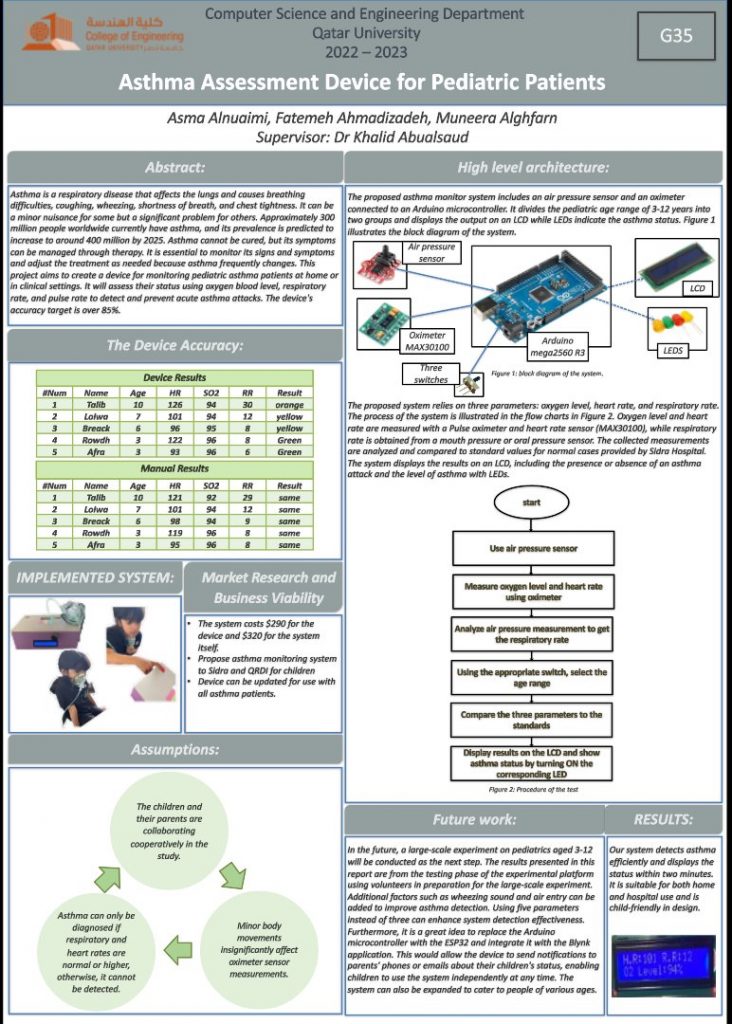
Our CSE students Ahmed Ibrahim, Renz Chuateco, and Sayer El-Hadidy won the 2nd place in Best Prototype, Most Creative Design Award, with their project titled: “Haptic Gloves Handball Goalkeeping Training System” and supervision by Dr. Noora Fetais.
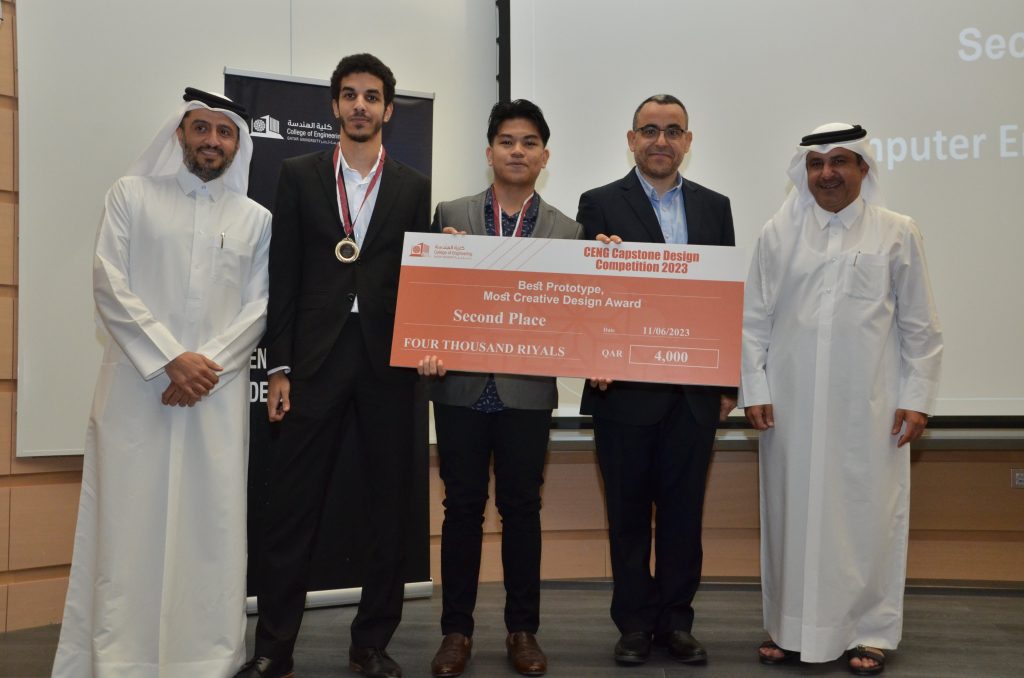
Our CSE students our students AlDanah AlAnazi, Dareen Douglas, and Maryam Al-Meraikhi won the 2nd place in Best Marketable Design Award with their project titled: “Integrated Accident Detection and Evaluation System Based on Vehicular Networks and Artificial Intelligence (IADES)” and supervision by Dr. Devrim Unal.
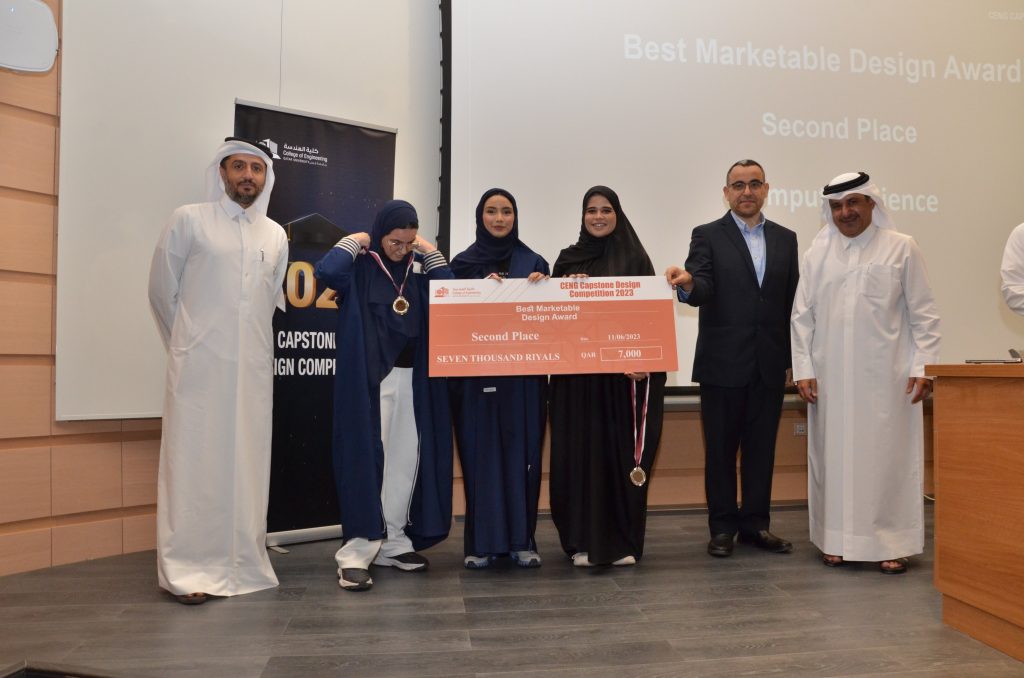
Virtual Reality Lab Project Wins Second Place in “Innovators in Education”
May 24, 2023 / Leave a comment
Qatar University recently concluded its “Innovators in Education” project in the presence of Her Excellency Mrs. Buthaina bint Ali Jabor Al-Nuaimi, Minister of Education and Higher Education, and a number of officials, deans of colleges and students participating in the project. The project is a groundbreaking initiative aimed at fostering innovative educational methods and enhancing learning opportunities for students. It brought together educators and university students to design educational resources and develop effective solutions to address challenges in the educational field. Among the impressive array of winners, the “Virtual Reality Lab: Redefining Remote Education” project claimed second place in the category of multimedia and learning software. The project is developed by the students Ahmed Ammar, Abdul Aziz Al Hams, and Mohamed Al-Yazidi under the supervision of Dr. Osama Halabi. The achievement highlights the transformative potential of virtual reality technology in redefining remote education and creating immersive learning experiences for students.
